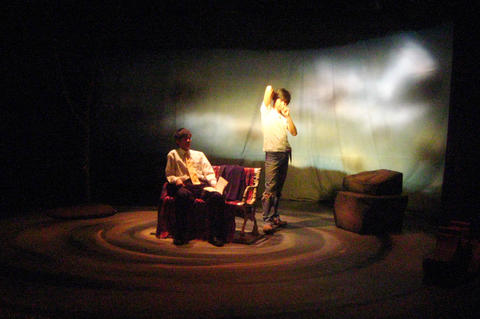Park benches often evoke images of tranquil afternoons and lovers on secret rendezvous, but in the hands of playwright Edward Albee, this innocuous image of urban America becomes a nightmare in which middle-class sensibilities are undermined.
Tonight, City Story Theater (城市故事劇場) presents The Zoo Story in Taipei (動物園的故事, In Taipei), a Mandarin version of Albee's original play, The Zoo Story.
Though written in 1958, director Chung Huan-yu (鍾環宇) says the play's themes - isolation, inequality and the brutal effects of consumerism - continue to resonate to this day. "Communication among people is superficial," said Chung on Tuesday in between rehearsals for the play. "We ignore people on the street who need help. This script is good because it reflects the reality of society."

Photo: Noah Buchan, Taipei Times
Though the original takes place in New York's Central Park, Chung says it's applicable to any metropolitan park throughout the world.
In the story, Peter, a publishing executive, is enjoying a peaceful interlude on a park bench when Jerry, a homeless man, interrupts his thoughts. The destitute man sits down and forces Peter to listen to stories of his life, including the reason why he visits the zoo.
At first too polite to leave, Peter eventually grows tired of Jerry's ramblings and stands up to go home. This is the catalyst that eventually finds Jerry dying of a knife wound and Peter's illusion of civility shattered.
Dialogue drives the play and it requires tremendous acting to pull off. It also requires an expert translator. Chung says that he read the work while studying at Taipei University of the Arts a few years ago and revised an old translation with his own additions. But one has to wonder about the quality of the work when its translator can't communicate in English.
Still, Chung seems to have a firm grasp of the themes Albee investigates.
"In today's society, in which people spend more time communicating with a computer screen than real human beings, it's even more important that we scrutinize how 'civilized' our communication has become. In any highly developed society, we need to face this kind of question," Chung said.

May 11 to May 18 The original Taichung Railway Station was long thought to have been completely razed. Opening on May 15, 1905, the one-story wooden structure soon outgrew its purpose and was replaced in 1917 by a grandiose, Western-style station. During construction on the third-generation station in 2017, workers discovered the service pit for the original station’s locomotive depot. A year later, a small wooden building on site was determined by historians to be the first stationmaster’s office, built around 1908. With these findings, the Taichung Railway Station Cultural Park now boasts that it has

The latest Formosa poll released at the end of last month shows confidence in President William Lai (賴清德) plunged 8.1 percent, while satisfaction with the Lai administration fared worse with a drop of 8.5 percent. Those lacking confidence in Lai jumped by 6 percent and dissatisfaction in his administration spiked up 6.7 percent. Confidence in Lai is still strong at 48.6 percent, compared to 43 percent lacking confidence — but this is his worst result overall since he took office. For the first time, dissatisfaction with his administration surpassed satisfaction, 47.3 to 47.1 percent. Though statistically a tie, for most

Six weeks before I embarked on a research mission in Kyoto, I was sitting alone at a bar counter in Melbourne. Next to me, a woman was bragging loudly to a friend: She, too, was heading to Kyoto, I quickly discerned. Except her trip was in four months. And she’d just pulled an all-nighter booking restaurant reservations. As I snooped on the conversation, I broke out in a sweat, panicking because I’d yet to secure a single table. Then I remembered: Eating well in Japan is absolutely not something to lose sleep over. It’s true that the best-known institutions book up faster

In February of this year the Taipei Times reported on the visit of Lienchiang County Commissioner Wang Chung-ming (王忠銘) of the Chinese Nationalist Party (KMT) and a delegation to a lantern festival in Fuzhou’s Mawei District in Fujian Province. “Today, Mawei and Matsu jointly marked the lantern festival,” Wang was quoted as saying, adding that both sides “being of one people,” is a cause for joy. Wang was passing around a common claim of officials of the People’s Republic of China (PRC) and the PRC’s allies and supporters in Taiwan — KMT and the Taiwan People’s Party — and elsewhere: Taiwan and